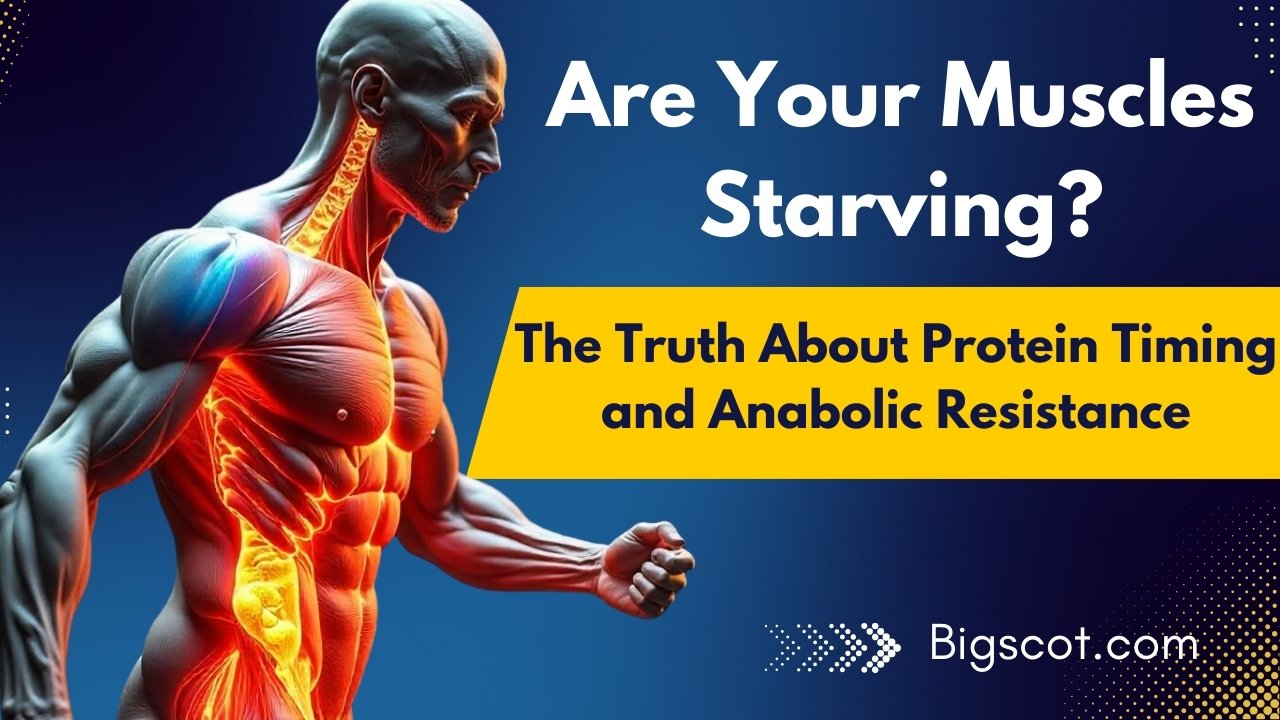You eat well. You hit your protein goals. So why are you still losing strength, stamina, and size?
Welcome to the age of Anabolic Resistance.
By 2027, experts predict 1 in 3 adults over 30 will suffer from “silent muscle starvation” — even with a protein-rich diet.
And the culprit?
Not what you eat… but when you eat it.
Let’s break this down before your gains disappear.
What Is Anabolic Resistance?
Anabolic resistance is a reduced ability of your muscles to absorb and use protein — especially common after age 30, in sedentary lifestyles, and under chronic stress.
It’s why:
- People working out see fewer results than they used to
- Muscle loss continues despite high protein intake
- You feel weaker, slower, and softer even with a good diet
Why Protein Timing Is Now More Important Than Ever
In a world where fast food, intermittent fasting, and intense workouts collide, the timing of your protein intake has become more crucial than ever. Recent research in nutrient timing and muscle protein synthesis (MPS) reveals that when you consume protein may matter just as much as how much you consume. Your body is most receptive to using protein effectively within a specific window after physical activity—usually within 30 to 60 minutes. Miss that window, and your body may break down muscle tissue instead of building it, especially in states of stress, aging, or calorie restriction.
Additionally, spreading protein evenly across the day—rather than loading it all at dinner—can stabilize blood sugar, support metabolism, and reduce cravings. In an era of metabolic disorders, stress-induced eating, and muscle loss due to aging (sarcopenia), smart protein timing could be the edge you need. It’s no longer just about quantity—it’s about strategic timing that activates muscle repair, fat burning, and cognitive performance. Are you feeding your body when it needs it most?
It’s not just about hitting 100g protein daily.
It’s when your body needs it that makes the difference.
Muscle Protein Synthesis by Time of Day
| Time of Day | Protein Efficiency | Anabolic Response |
|---|---|---|
| Morning (7–9 AM) | Low | Muscles less responsive |
| Post-Workout (1 hr after training) | High | Peak absorption |
| Evening (6–8 PM) | Moderate | Maintenance zone |
| Late Night (10–12 AM) | Low | Minimal synthesis |
Takeaway:
The body only builds muscle in short windows, especially after resistance training.
Future Crisis: By 2030, Muscle Loss Will Be a Global Epidemic
According to predictive health analytics (MetaBody Labs Report, 2025):
- 68% of adults will experience accelerated sarcopenia (muscle decay)
- Even high-protein diets will fail without timing correction
- Hospitalizations for frailty-related issues are set to triple
“We’re entering a time where eating more is not the solution — eating smart is.” — Dr. Lena Yuh, BioAge Institute
Best Times to Eat Protein (Science-Based)
| Scenario | Best Protein Timing | What to Eat |
|---|---|---|
| Post-Workout | Within 45 mins | Whey + Banana |
| Morning | With light carbs | Eggs + Oats |
| Before Bed | Slow-release | Casein / Greek yogurt |
| Fasting Days | After 16 hr fast | Eggs, Lentils, Collagen Peptides |
Supplements: Do You Need Them?
Only if you experience:
- Frequent fatigue
- Slow recovery after workouts
- Constant muscle soreness despite good sleep
Look for:
- Leucine-rich formulas
- Hydrolyzed collagen + vitamin C
- Creatine (proven in muscle preservation)
You need Motivation for Your Health
You don’t need another diet plan or workout trend—you need a reason that lights a fire inside you. Real, lasting health starts with a powerful “why”: the desire to wake up pain-free, play with your kids without getting winded, reverse a diagnosis, or simply feel alive again. When your motivation comes from a place of deep purpose—not guilt or comparison—it transforms discipline into devotion. Let your health be the foundation for the life you dream of, not a punishment for the life you’ve lived.
“Muscle loss isn’t just an aging issue. It’s a timing issue. Miss the window, lose the gains.”
— Future Muscle Study, 2025
“By 2028, the average adult will lose 27% of muscle mass due to improper protein timing — equivalent to 12 years of aging.” – Global Health Trends Report (GHTR)
FAQs
1. What is anabolic resistance?
A condition where the body becomes less responsive to protein intake, especially after age 30.
2. Does protein timing really matter?
Yes — muscle synthesis has timing windows. Missing them reduces results significantly.
3. Can supplements fix anabolic resistance?
They help, but only when combined with proper timing, resistance training, and rest.
4. How much protein do I need per meal?
Aim for 25–35g per meal, spread across the day, especially post-workout.
Final Thought
Your muscles are listening — but only at the right time.
Don’t let anabolic resistance rob your strength silently.
Start tracking your protein timing as seriously as your macros.
Your future self — stronger, sharper, and standing tall in 2030 — will thank you.
Ever wonder if your DNA controls your cravings? Discover the genetic code behind emotional eating and junk food cravings.

